Reporting from the Field
From January 17 to February 24, 2018
Panel discussion
Exhibit Opening
Jan. 17, 2018 at 6pm
Jan. 17, 2018 at 7pm
Curator(s)
Designer(s)
Location
The Gallery at VCUarts Qatar
Exhibition Design
Production Team
Students in Interior Design:
Al Jazi Al-Thani, Hala Alzawaydeh, Hemian Al-Noaimi, Maha Mubarak, Nada Ibrahim, Sara Mashhadi and alumna Theekshani Perera
Students from MFA in Design: Majdulin Nasrallah and Sultana Jesmine
Photography
Documentary Photographers
Senior Editor, Special Projects
Acknowledgement
Reporting from the Field transfers the audience directly to the humanitarian front and specifically inside the design studio LATRA Innovation Lab which is situated in a refugee camp in Lesvos, Greece.
The show follows the work of LATRA, which set up the LATRA Innovation Lab directly inside refugee camps in Greece. The lab acts as an innovative incubator that brings together an international network of social organizations, enterprises, governments, non-government organizations (NGOs), and intragovernmental organizations (IGOs) as well as independent designers, makers and innovators for the purpose of developing socially impactful solutions directly in the field.
The show also displays design outcomes of “Core Relief: The 1st International Humanitarian Design Workshop” that took place in Lesvos, Greece in October 2016.
A panel discussion about the successful implementation of innovative projects in the humanitarian field sector takes place on January 17, 2018 before the opening reception of the exhibition. National and local organisations such as UNESCO, Reach Out Asia, Red Crescent, and WISE are represented by esteemed panelists. The panel discussion is moderated by Mr. Aris Papadopoulos, a humanitarian innovator, and the founder of LATRA, and the panelist are:
Mrs. Ameena A. Hussain, Director, Programs and Community Development, WISE;
Ms. Marion Desmurger, UNESCO, Communication and Information Sector, Senior Programme Assistant in the Arab States of the Gulf and Yemen;
Mr. Anwar Abdulbaki, ICT for Education Manager Reach Out Asia (ROTA), a programme of Education Above All;
Mr. Mahmoud Elsisi, Head of Quality and Process Management at Qatar Red Crescent.
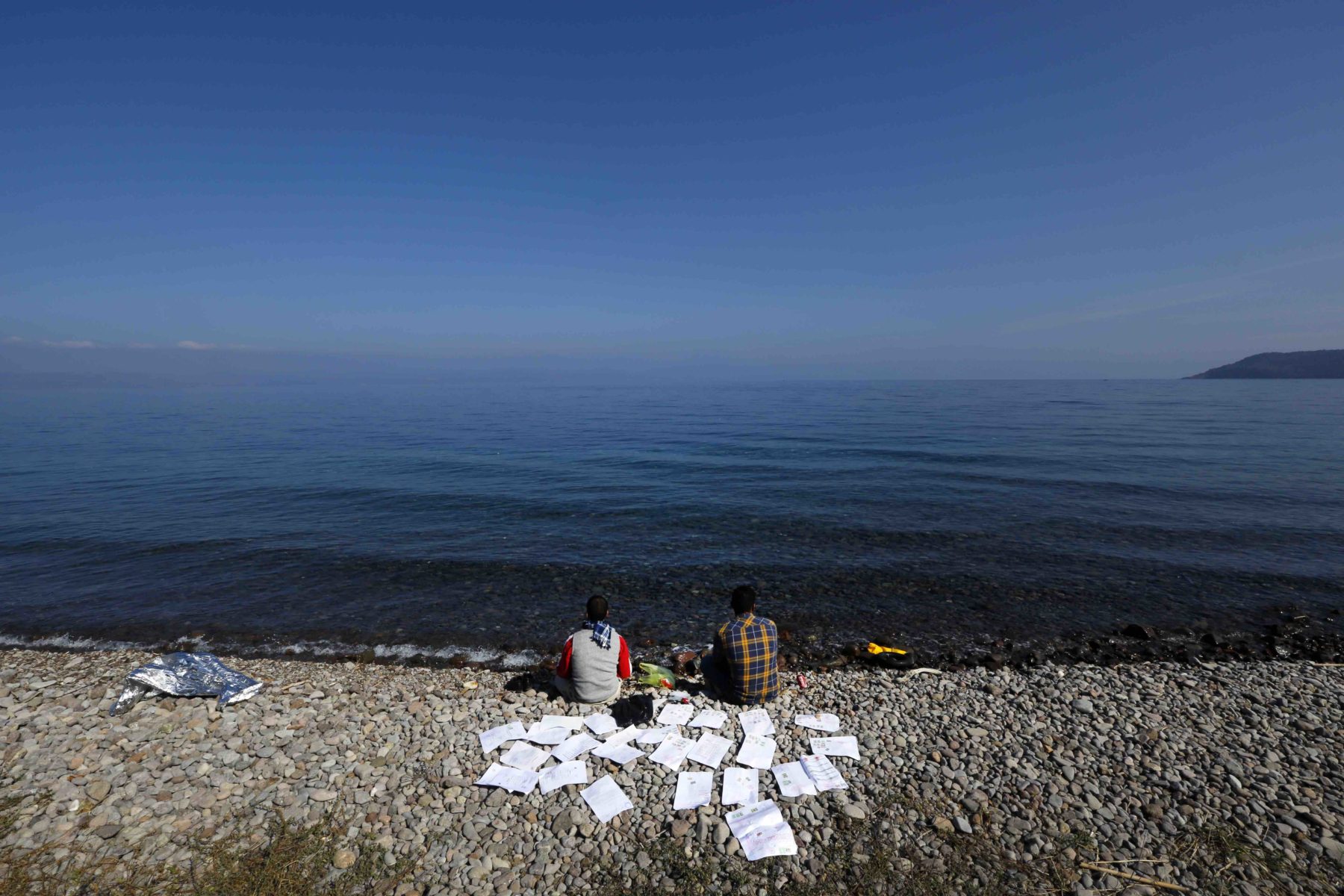
LATRA
Overview
LATRA is an award-winning incubator specializing in circular design, environmental engineering and digital innovation for the humanitarian sector.
In response to the European refugee crisis, LATRA established a technology driven makerspace in the refugee camp of Lesvos , Greece, where it implements innovation-led projects directly on the field, and advocates for the equitable development of beneficiaries through STEM (science, technology, engineering, and mathematics) learning programs. LATRA has developed a global consortium of governments, social organizations, knowledge institutions and financiers with the aim to create an on-the-field incubator that fosters innovation, allows for acceleration in social entrepreneurship, empowers economic growth through STEM skills, and develops all-inclusive hands-on learning experiences that assist in integration. LATRA places multidisciplinary actors directly in the field with access to innovative design technology, where with the help of pioneering humanitarian organizations creates an environment that will allow for opportunities in social innovation, economic empowerment and direct, all-inclusive learning experiences.
LATRA’s goal is to empower the beneficiaries with STEM skills, in order to jointly implement innovative projects on the field and connect migrant and local communities through technology to promote peace and justice.
LATRA has developed humanitarian innovation projects in Greece, South Africa, Sweden, Norway and the UK, and in 2016 organized ‘CORE RELIEF’, the first International Humanitarian Design Workshop in Lesvos, focusing on applications of innovative technology in the provision of humanitarian aid (corerelief.org). LATRA is a member of the UNICEF Design Pool and its work has been published widely and exhibited internationally. LATRA was awarded first prize in the global 2017 B. Creative Challenge organized by KEA European Affairs, received a start-up grant and two internationalization programs from the Stimuleringsfonds Creative Industries Fund in the Netherlands, as well as a Culture & Art Program by the Nordic Council of Ministers in Finland.
Curator statement
By Aris Papadopoulos
More people are displaced today than ever before. Unwillingly, abruptly, suddenly and forcibly, 65 million people lost their homes, countries, families and loved ones. The average displaced person has a few critical hours to decide what he can take with him before fleeing his home, and yet the average time spent a displaced person spends in a refugee camp is 17 years.
It is the role of social innovators to deliver impact solutions that merge technology, design and entrepreneurship to address these great challenges at the point of most need directly on the field. The exhibition takes the guest inside one of the few design incubators that exist inside a refugee camp. Uniquely located on Lesvos, which is at the center of a significant humanitarian situation LATRA has over the last two years, facilitated more than 100 innovators who have travelled to Greece to work on solutions that empower refugees with solutions that allow them to take control of their lives and futures.
Curator statement
By Maja Kinnemark
Poverty has always existed, but the last 50 years have made us rich enough to actually do something about it (1). The media is providing us with doomsday reporting every day, but in fact the world for mankind is getting better; more kids are surviving their first four years, illiteracy rates are falling and we have a fast-growing middle class in developing countries. The numbers have changed (2).
Someone once told me that a “camp is for cattle”, and I believe he is right. No human should ever have to live in a camp. The war in Syria has driven over 12 million people from their homes (3), and in March 2016 it was reported that 573,625 of them had crossed to Europe via Lesvos (4) – the part of Europe that is closest to Turkey. Mythilini, the main town on Lesvos has a population of around 30,000 people. Yet the Greek government is struggling to provide basic healthcare for their own children. Healthcare spending in the country fell by 40% between 2009–15 as a result of the economic crisis, according to a report by Deloitte.
Many among us here in Qatar have family and friends who are deeply affected by the war in Syria, and this has led VCUarts Qatar to engage in a collaboration with the Greek organization LATRA on the island of Lesvos.
It is important to acknowledge that what people in the camp really need is to get out of there. No design solution will ever make refugee camp life bearable for its inhabitants, but it can help make the situation more tolerable.
We are not proposing solutions, but instead ways of making transit life less stressful. We are not attempting to normalize camp life, but to “design like we give a damn” (5), to paraphrase the title of the book by Architecture for Humanity, because in the humanitarian field good design really matters.
The problem that the world is facing is that temporary camps are becoming permanent, because people are not being allowed to continue their journeys to Europe. When camps become permanent we are building our own slums. Right now, slums are being built just beyond the fringes of the EU, with no prospect that their inhabitants will be allowed to continue
their journeys to a better life.
We live in times of migration, and as privileged designers and artists I believe it is our duty to address these questions.
1. Thomas Pogge, Director of the Global Justice Program and Leitner Professor of Philosophy and International Affairs at Yale University
2. Hans Rosling Professor of International Health at Karolinska Institute, co-founder and Chairman of the Gapminder Foundation
3. UNHCR, 2016
4. The Telegraph, March 2016 (http://www.telegraph.co.uk/travel/destinations/europe/greece/articles/greek-islands-affected-by-refugee-crisis/)
5. Kate Stohr and Cameron Sinclair, Design Like You Give A Damn: Architectural Responses to Humanitarian Crises, Metropolis Books 2008
We live in times of increased migration. The big question is how do we build for a sustainable integration of people?
- Curator Maja Kinnemark
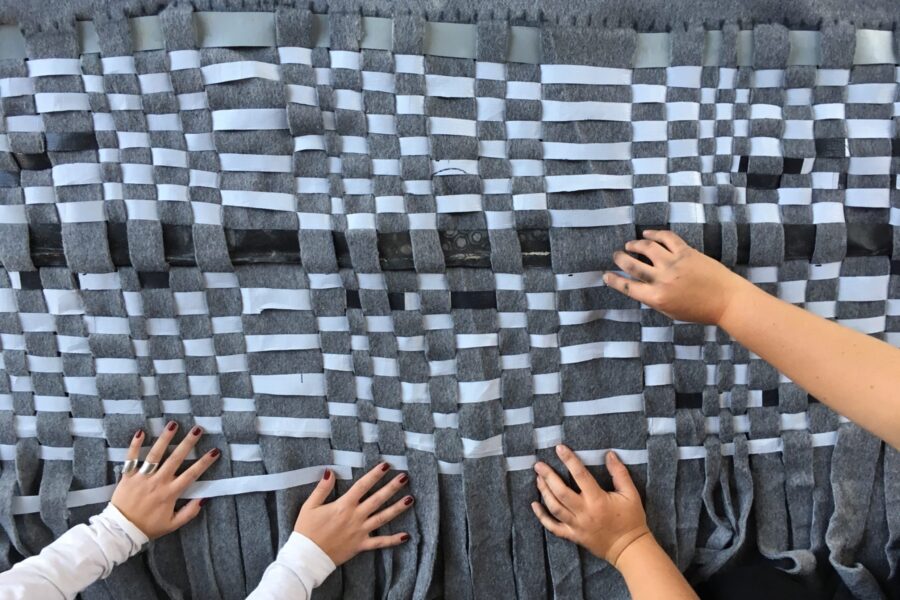
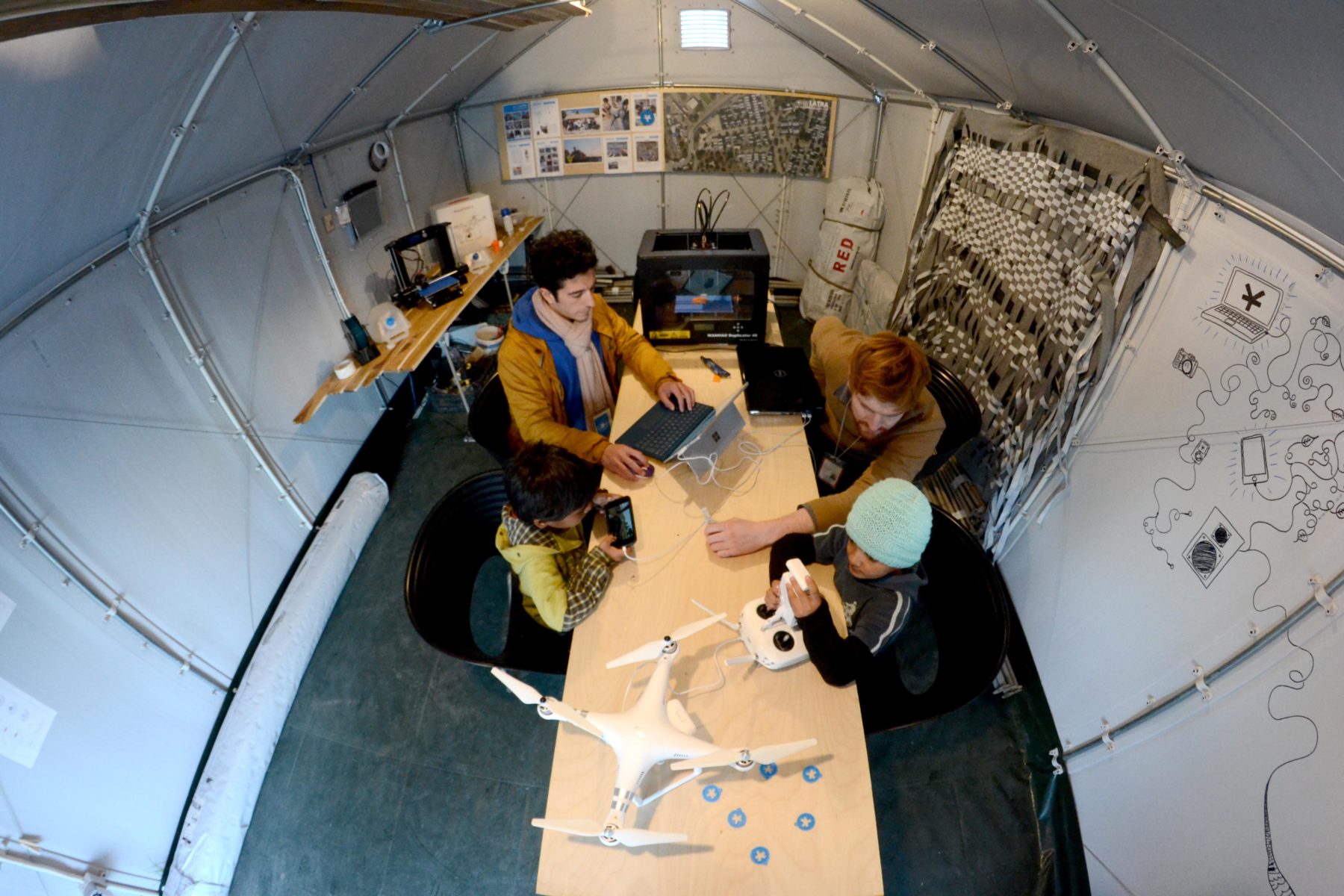
Biographies
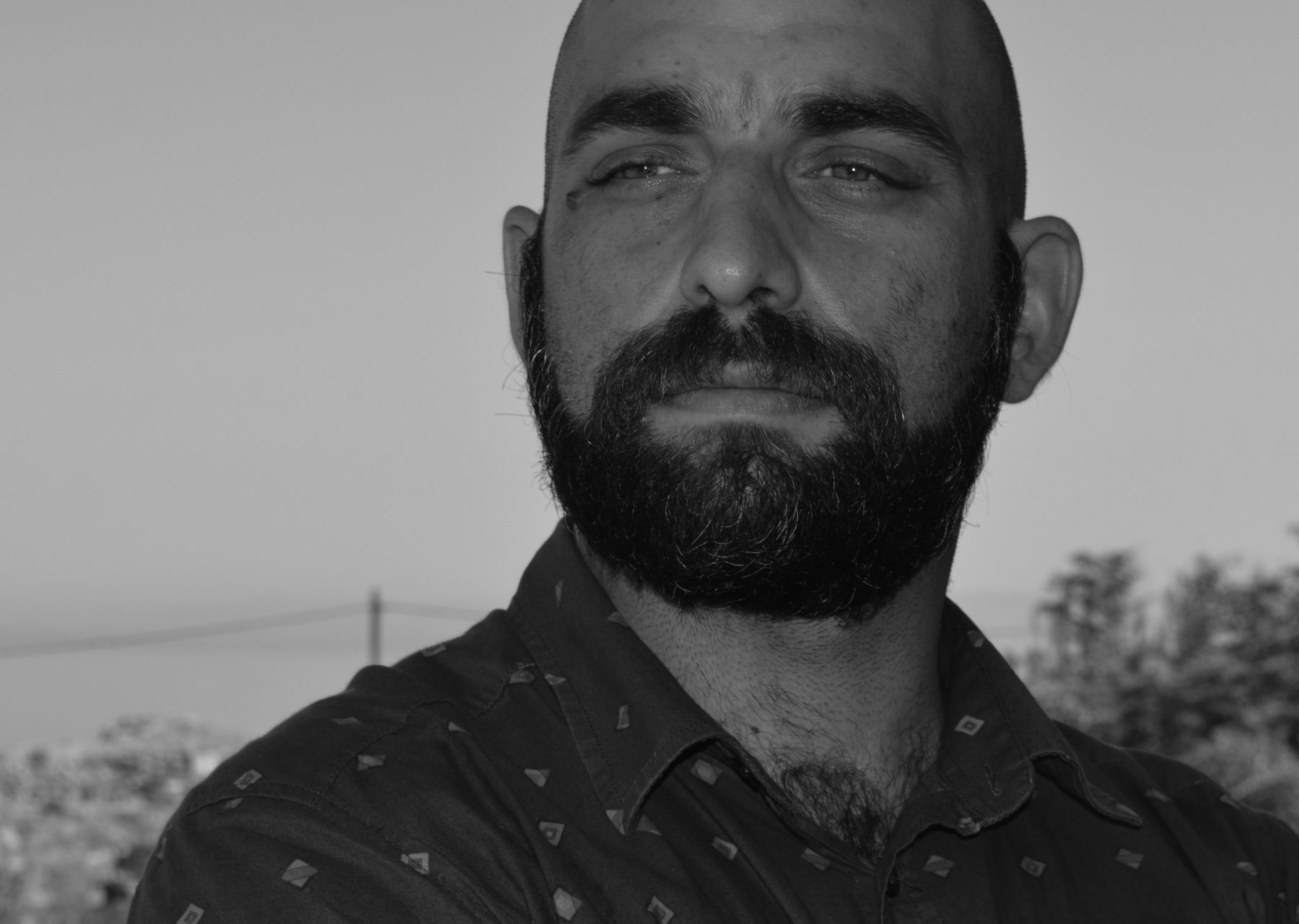
Aris Papadopoulos is a humanitarian innovator, and the founder of LATRA, an award-winning incubator specializing in socially responsible projects that promote innovation, technology and entrepreneurship in the humanitarian sector.
In response to the world’s largest humanitarian crisis, Aris established LATRA inside a refugee camp on his native island of Lesvos (Greece), in order to challenge the frontiers of innovation, technology and entrepreneurship in the humanitarian sector. LATRA won first prize in the 2017 Global B. Creative Challenge, and Aris was shortlisted for the prestigious ARUP Global Research Challenge 2017, for his work on the refugee camps of Lesvos. He has been awarded a start-up grant and two internationalization programs by the Creative Industries Fund in the Netherlands, as well as a Culture & Art Program by the Nordic Council of Ministers.
Aris is a member of the global UNICEF Design Pool, and his work can be found in Greece, South Africa, Sweden, Norway and the United Kingdom. Aris is an architect and an engineer who graduated from the Architectural Association School of Architecture in London and he later studied Management & Economics of Innovation at University College London.
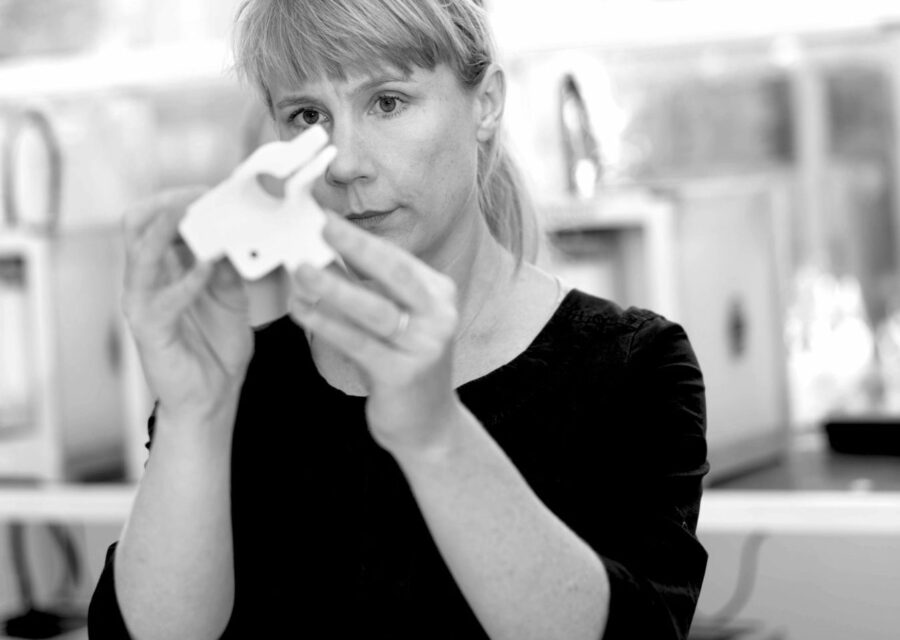
qatar.vcu.edu/people/maja-kinnemark
Maja Kinnemark has a diverse background in cabinet making, furniture design, exhibition design, sculpture and installation art.
She has designed exhibitions for clients such as the Natural History Museum in Sweden and the Souq Waqif Art Centre in Qatar. She holds a master’s degree in Design Research from the RMIT School of Architecture in Melbourne.
During her years at VCUarts Qatar, she has been a constant advocate for socially sustainable design and her work aiming at improving the housing situation for displaced individuals, migrant workers in Qatar and refugees in Greece, has been successfully incorporated in her teaching.
Public Programming
Jan. 17, 2018 ― 7 to 8 PM
Opening reception with curators Aris Papadopoulos and Maja Kinnemark
Jan. 18, 2018 ― 12:30 to 1:30PM
Qatar Foundation Art Trail: Guided tour of the exhibition with curator Maja Kinnemark and VCUarts Qatar students production team
Video
Refugee Camp 3D
©LATRA Innovation Lab
Photo Gallery
Related Topics
Crossing Boundaries Lecture
Exhibition
Wavelength Lecture